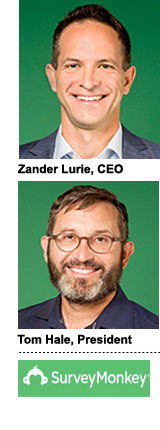
Founded in 1999, SurveyMonkey has evolved beyond its original positioning as a provider of email questionnaires.
The 18-year-old company is on a $200 million revenue run rate for 2017, and CEO Zander Lurie says its next wave of growth will come from the rise of cross-device survey data.
“We see a big opportunity to grow in the people-powered data space, which is extremely important for businesses that are drowning in data,” Lurie told AdExchanger.
Key to that strategy are mobile touch points with consumers. About 35% of the company’s survey completions in the US now happen on mobile devices, as more clients take advantage of “conversational UIs” like Slack and Facebook Messenger.
SurveyMonkey uses its integrations with these apps to instantly poll users, collect feedback and improve completion rates – for instance, by using multiple choice rather than open-ended questions if a user is on a mobile device.
Machine learning is aiding this effort, according to President Tom Hale.
“We looked at about 100 million surveys in our database and sorted them by metrics like completion rates and time to complete,” Hale said. “We analyzed patterns to see if there were predictors for a low completion rate or abandonment and built that into an intelligence tool.”
SurveyMonkey also plugs into CRM systems and says it can link survey data to marketers’ customer records.
The company is making a run at the $25 billion global market research business, courting larger enterprise clients such as GoPro and Samsung.
Its panel-based offering is available on a self-serve basis and reaches 3 million people daily across a wide range of segments.
For instance, a CPG could use its platform to reach the right demographic of survey respondents when testing new product packaging with select audiences, such as Hispanic women aged 18 to 25.
“We are a scaled operator that reaches a global audience across geographies and industries,” Hale said. “Market research tends to be measured in the timeframe of weeks to months, but we believe businesses today need to be responding at a much faster rate. Being able to field research [inquiries] and analyze data within hours is a real competitive advantage for us.”
This post was syndicated from Ad Exchanger.

More Stories
Warner Bros. Discovery CEO David Zaslav Receives $51.9 Million Pay Package for 2024
TikTok Fave Duolingo Boosts YouTube Shorts Viewership 430% in One Year
Streaming Ratings, Week of March 10: Disney+ Sails to the Top Courtesy of Moana 2